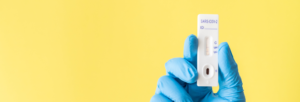COVID-19 Testing: Types of Tests
October 4, 2022
Viral tests look for a current infection with SARS-CoV-2, the virus that causes COVID-19, by testing specimens from your nose or mouth. There are two main types of viral tests: nucleic acid amplification tests (NAATs) and antigen tests. In certain circumstances, one test type may be recommended over the other. All tests should be performed following FDA’s requirements.
- NAATs, such as PCR-based tests, are most often performed in a laboratory. They are typically the most reliable tests for people with or without symptoms. These tests detect viral genetic material, which may stay in your body for up to 90 days after you test positive. Therefore, you should not use a NAAT if you have tested positive in the last 90 days.
- Antigen tests* are rapid tests which produce results in 15-30 minutes. They are less reliable than NAATs, especially for people who do not have symptoms. A single, negative antigen test result does not rule out infection. To best detect infection, a negative antigen test should be repeated at least 48 hours apart (known as serial testing). Sometimes a follow-up NAAT may be recommended to confirm an antigen test result.
*Self-tests, or at-home tests, are usually antigen tests that can be taken anywhere without having to go to a specific testing site. Follow FDA and manufacturer’s instructions, including for the number of times you may need to test. Multiple negative test results increase the confidence that you are not infected with the virus that causes COVID-19.
- You can order free self-test kits at COVIDtests.gov or purchase tests online, in pharmacies, and retail stores.
- You can also visit FDA’s website to see a list of authorized tests.
- As noted in the labeling for authorized over-the-counter antigen tests: Negative results should be treated as presumptive (meaning that they are preliminary results). Negative results do not rule out SARS-CoV-2 infection and should not be used as the sole basis for treatment or patient management decisions, including infection control decisions. Please see FDA guidance on the use of at-home COVID-19 antigen tests.
To learn more, please visit https://www.cdc.gov/coronavirus/2019-ncov/symptoms-testing/testing.html#types-of-tests